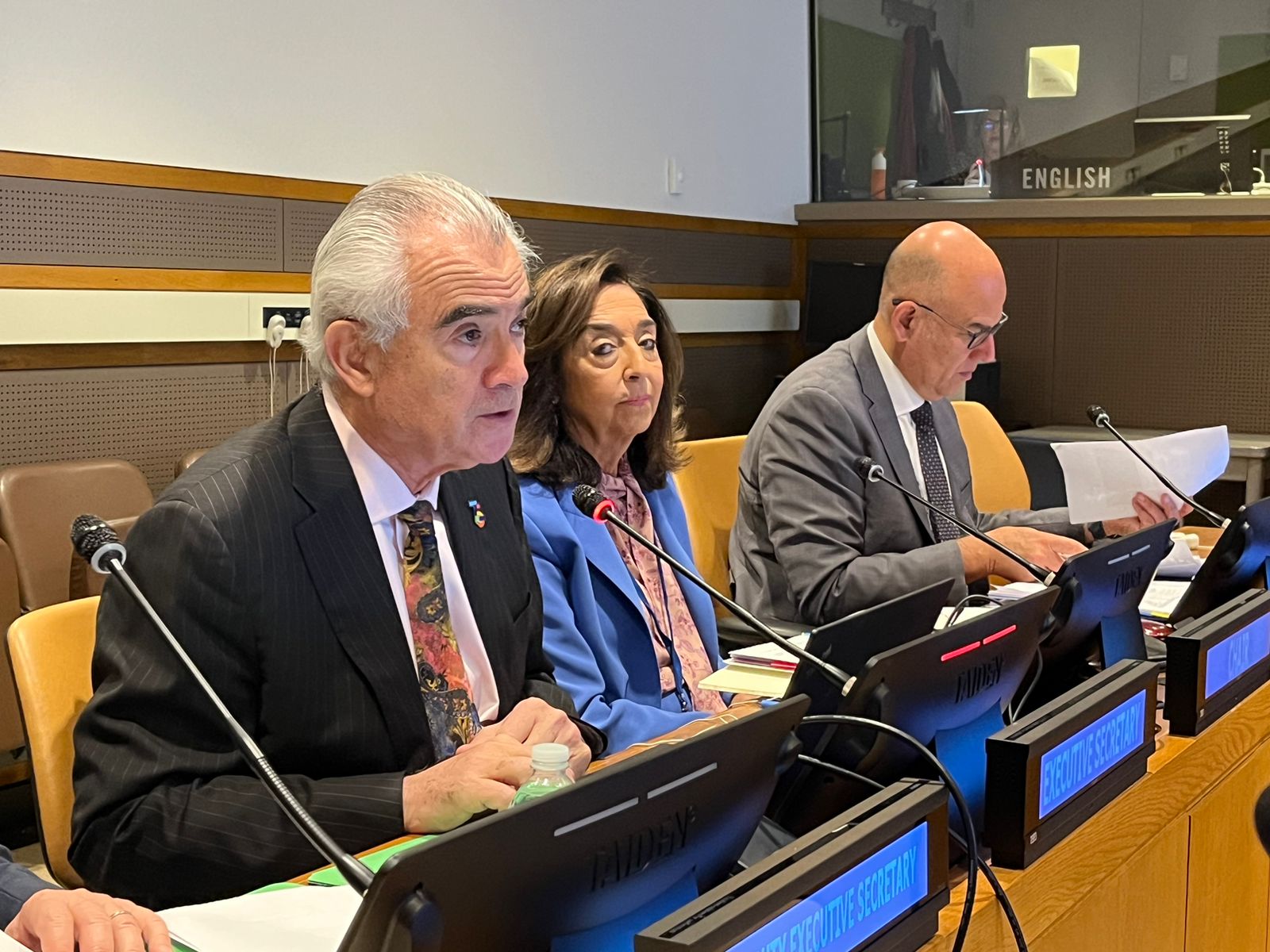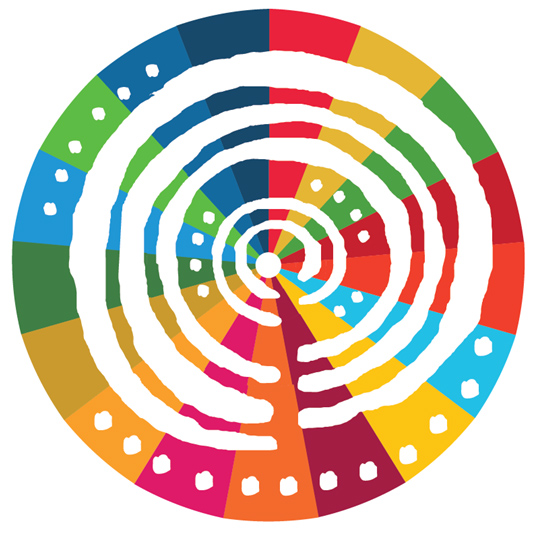ECLAC’s Member Countries Hold 37th Session of the Organization’s Committee of the Whole in New York
Work area(s)
This body reports on the Commission’s activities in 2022 and enables analysis of its 2025 programme of work. The meeting was led by the United Nations regional institution’s Executive Secretary, José Manuel Salazar-Xirinachs.

Ambassadors and official representatives of member countries of the Economic Commission for Latin America and the Caribbean (ECLAC) met this Tuesday, October 17 at the United Nations headquarters in New York to conduct the Thirty-seventh session of the Committee of the Whole of the organization, where participants reviewed a report on the Commission’s activities in 2022, presented a proposal on the 2025 programme of work for its adoption, and shared an updated overview of the socioeconomic situation in the region.
The Committee of the Whole of ECLAC is the official administrative body that allows member countries to meet between the Commission’s sessions to be able to receive their guidance on the organization’s current and future work. Its 37th session was led by the Executive Secretary, José Manuel Salazar-Xirinachs, and the Permanent Representative of Argentina to the United Nations, María del Carmen Squeff, whose country is serving as Chair of ECLAC in the 2022-2024 period.
Participating in the meeting were diplomatic representatives of 34 member countries of ECLAC, along with staff from the United Nations Regional Commissions New York Office and from the Commission’s Secretariat.
In her welcome remarks, Ambassador María del Carmen Squeff recognized that since its creation 75 years ago, ECLAC has been an inspiring force that has motivated various transformations in Latin America and the Caribbean with its conceptual frameworks and evidence-based reports.
She explained that, as indicated in ECLAC’s report Halfway to 2030 in Latin America and the Caribbean: progress and recommendations for acceleration (sixth report on regional progress and challenges in relation to the 2030 Agenda for Sustainable Development in Latin America and the Caribbean) – which was presented in Santiago, Chile in April of this year during the Sixth Meeting of the Forum of the Countries of Latin America and the Caribbean on Sustainable Development 2023 – the region is not halfway down the path to achieving the Sustainable Development Goals (SDGs). According to available data, only one-fourth of the targets have been met or are forecast to be met by 2030. Forty-eight percent (48%) of the targets are heading in the right direction but not quickly enough to be fulfilled on time, and 27% have suffered setbacks. Thus, 75% of the targets are at risk of not being achieved, unless resolute action is taken to get back on the right track.
“To resume the path towards achieving the SDGs, a transformative recovery is needed in the region. This can only be achieved through dialogue and cooperation and will be Argentina’s priority as Chair of ECLAC,” Ambassador Squeff added.
Meanwhile, ECLAC’s Executive Secretary told participants that this meeting is also a space for hearing and receiving firsthand their perspectives, observations and concerns about the various processes that will be carried out in the coming months, so they can guide ECLAC as to how they want the Commission to keep supporting them.
“In that regard, we listened to you closely during the general debate of the 78th session of the General Assembly, including during the SDG Summit and at the preparatory ministerial meeting for the Summit of the Future in September, where the region’s leaders pointed to various socioeconomic and environmental challenges such as inequalities, including those relating to gender, poverty, threats to human rights, the digital divide, slow economic growth, the lack of development financing, the unsustainable debt situation, and the devastating consequences of climate change, among many others, which are hindering achievement of the SDGs. Other geopolitical factors are also aggravating regional prospects for accelerating implementation of the 2030 Agenda, with consequences for our region’s peoples, such as food insecurity, forced migration, violence in all its forms and organized crime, and it is therefore necessary to promote transformative actions and reforms in the national and multilateral arenas,” José Manuel Salazar-Xirinachs stated.
Later, in his presentation on the socioeconomic context in Latin America and the Caribbean, ECLAC’s Executive Secretary highlighted the priority areas that must be addressed in order to confront the region’s structural challenges and achieve the transformation of its development model with growth that is high, sustained, sustainable and inclusive.
These are: macroeconomics for development; inequality and social mobility; regional economic integration; gaps in social protection; migration; education and vocational training; the digital transformation; gender equality and the care society; and sustainability and climate change. All of these require the State’s institutional capacities, governance and social dialogue, he explained.
“Economic growth is very important, but we must remember that there is no conflict between growth and the planet, or between growth and inequality. What is needed is a certain type of growth that is productive, inclusive and sustainable. The way to combat today’s low, exclusionary and unsustainable growth is not by abandoning the pursuit of growth, but by changing the course we find ourselves on now,” he emphasized.
“How can we change course? Building a more productive, inclusive and sustainable future requires getting behind sectors that drive and invigorate growth and applying the new generation of Productive Development Policies to them,” the senior United Nations official said. These sectors include the energy transition to renewable energies, electromobility, the circular economy, the bioeconomy, the pharmaceutical industry, and gender equality and the care society, to mention a few.
With regard to achieving the SDGs in the region, Salazar-Xirinachs indicated that it is necessary to foster swift and profound transitions to comply with the Political Declaration (approved at the recent SDG Summit, held on September 18-19 in New York). “It is necessary to prioritize policies and investments that would have multiplier effects on the Goals,” he stated.
These transitions can be grouped into six areas related to digital connectivity, climate, education, energy, food systems, and jobs and social protection. “The transitions for achieving the Goals by 2030 arise from the summit processes and from their high capacity for synergy with different SDGs. Taking action on one transition advances many SDGs simultaneously,” he said.
In addition, he announced that the Seventh Meeting of the Forum of the Countries of Latin America and the Caribbean on Sustainable Development – to be held at ECLAC’s headquarters in Santiago, Chile in April 2024 – will take into consideration the Political Declaration of the SDG Summit and preparations ahead of the Summit of the Future (due to take place in September 2024 in New York) and will be focused on the theme of the High-Level Political Forum on Sustainable Development 2024: "Reinforcing the 2030 Agenda and eradicating poverty in times of multiple crises: the effective delivery of sustainable, resilient and innovative solutions.”
At the end of the 37th session of the Committee of the Whole of ECLAC, the participating delegates approved a draft resolution in which they adopt the Commission’s programme of work for 2025 and welcome the Report on the Commission’s 2022 activities presented today, underlining the wide-ranging outcomes achieved by the Commission in the different areas of work and commending its results-based approach and capacity to respond to the needs of the Member States of the region.
Country(ies)
- Latin America and the Caribbean
Contact
Public Information Unit
- prensa@cepal.org
- (56 2) 2210 2040
